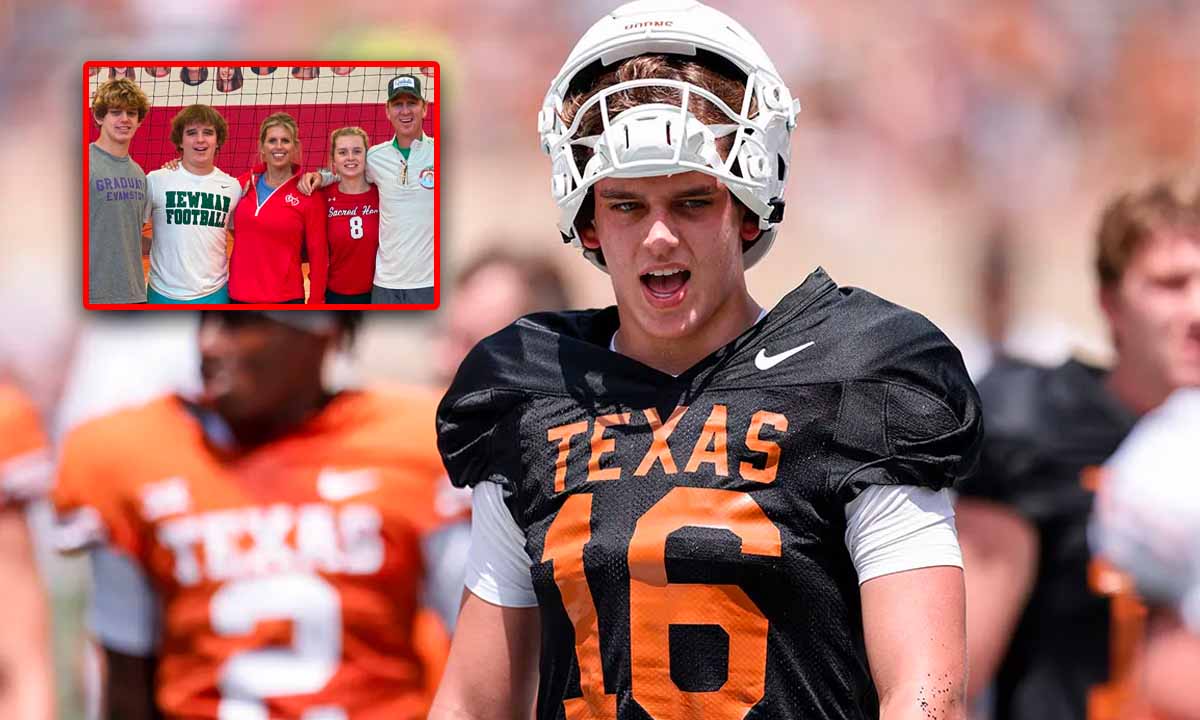Sports
Arch Manning’s Parents and Siblings – Football Has Been a Generational Sport in His Family
The Manning Family is on its third generation now!

Arch Manning is an American football quarterback for the Texas Longhorns.
Generation after generation, football has been played in Arch’s family. His dad used to be a football player, and so did his dad. Arch is currently the third generation in the Manning family who has started his career in football.
Here is all we know about the Manning family as well as Arch’s bio.
The Manning family
The Mannings are an American family that has become well-known in the sport of American football due to many members of the family playing quarterback. They are regarded as a dynasty in the sport.
The first Manning to play in the National Football League (NFL) was Archie Manning of Mississippi. He played most of his career for the New Orleans Saints in New Orleans, Louisiana.
Since then, Louisiana has been the Manning family’s home.
Three Manning family members and siblings have enjoyed prosperous careers as professional and collegiate football players. They have competed in the National Football League (NFL) and the Southeastern Conference (SEC) of the National Collegiate Athletic Association (NCAA).
Two College Football Hall of Fame inductions, three SEC Player of the Year awards, twenty cumulative Pro Bowl selections, seven first-team All-Pro selections, five NFL MVP awards, six Super Bowl appearances, four Super Bowl victories, three Super Bowl MVP awards, five ESPY Awards, and one Pro Football Hall of Fame induction are just a few of the football accolades that the Manning family has received.
As said before, the first generation of their family in football, Archie, played professionally for the New Orleans Saints, Houston Oilers, and Minnesota Vikings in addition to attending Ole Miss for his undergraduate studies. Inducted into the College Football Hall of Fame, he is a first-team All-American and a two-time Pro Bowl pick.
The second generation of the Manning family includes Archie’s sons — Cooper Manning, Peyton Manning, and Eli Manning.
Cooper was a wide receiver in high school who planned to play football at Ole Miss, his father’s alma mater. However, Cooper was forced to give up the sport after receiving a spinal stenosis diagnosis.
Peyton was a Consensus All-American during his time as a collegiate player at Tennessee. He also played professionally with the Indianapolis Colts and Denver Broncos, going to two Super Bowls and winning one with each team.
Along with being inducted into the College Football and Pro Football Halls of Fame, he is a 14-time Pro Bowl selection, a five-time NFL MVP, the MVP of Super Bowl XLI, and the recipient of five ESPY Awards — three for Best NFL Player, one for Best Championship Performance, and one for Outstanding Team with the Colts in 2007.
Eli was selected to the Pro Bowl four times while playing professionally for the New York Giants and as a collegiate player for Ole Miss. He also won two Super Bowl MVP awards.
Now, the Manning family is in their third generation because of Arch. Arch is following in his dad’s footsteps and is an American football quarterback for the Texas Longhorns.
Arch Manning’s bio
Arch was born on April 27, 2005, making his age 18 as of 2023. He was born to his parents, Cooper and Ellen Heidingsfelder Manning.
As said before, his dad was a football player who could not continue his dreams because of spinal stenosis diagnosis. Regardless, Cooper is still a vital member of the Manning family’s support network and has achieved success in the energy investment sector despite not pursuing a career in professional football.
He continues to be active in the media and occasionally contributes to articles on sports. On the other hand, there is not much information known about his mother, Ellen.
Cooper and Ellen have three kids, meaning that Arch has two siblings — May, born in 2002, and Heid, born in 2006. Arch is the middle child of his parents and the only one among his siblings who is involved in football.
Talking about his football career, in his first year of high school, Arch made headlines as a varsity starter at Isidore Newman in New Orleans, Louisiana. He won the MaxPreps National Freshman of the Year award after an outstanding first year that featured 2,407 passing yards and 34 touchdowns.
As a sophomore, he excelled even more, tossing six touchdown passes in one game.
Despite Arch’s extraordinary potential, the Manning family has kept him out of the spotlight by turning down early college scholarships and keeping a modest profile on social media.
Arch started his college hunt and visited esteemed universities such as Ole Miss, SMU, Clemson, LSU, Alabama, Texas, Georgia, and Virginia. He formally committed to the University of Texas in June 2022, starting a new chapter in his exciting football career.
Arch signed a letter of intent to play for the University of Texas on December 21, 2022. On June 23, 2023, he committed to play football for the Longhorns in college.
He redshirted in 2023 in his true freshman year. In the third quarter of a rout of Texas Tech on November 24, 2023, he completed two of his five throwing attempts for thirty yards to mark his college debut.
Sports
Venkatesh Iyer and Priyanka Jawalkar’s Dating Rumors Were False
Venkatesh Iyer noted, “Cute!!” in the Telugu actress Priyanka Jawalkar’s photo.

Venkatesh Iyer is a professional Indian cricketer who plays for Madhya Pradesh in domestic cricket and Kolkata Knight Riders (KKR) in the Indian Premier League (IPL).
With his outstanding performance, the Kolkata Knight Riders batsman led the team to the IPL championship in 2024. He also played a huge part in the team’s 2021 campaign where they were the runners-up.
In addition to his professional success, Iyer once gained national attention for his sly comment on a Telugu starlet’s post.
Venkatesh Iyer and Priyanka Jawalkar dating rumors
With his Instagram comment, KKR’s star Iyer became widely discussed.
A heated debate regarding whether Telugu actress Priyanka Jawalkar was the girlfriend of Iyer broke out after he left a comment on Jawalkar’s photo on Instagram.

Venkatesh Iyer commented on Priyanka Jawalkar’s post (Source: jawalkar/Instagram)
The actress posted a beautiful picture of herself with the caption “Boo” to her official Instagram account, smiling and hiding behind some curtains.
Iyer, in the meantime, added a statement that later prompted dating rumors. On the Telugu actress’ photo, he wrote “Cute!!,” to which she responded, “Who? You?”
Fans of the player couldn’t help but gush at the thought of romance blooming between the two, judging by Jawalkar’s response to his comment.
However, Iyer and Jawalkar did not respond to the rumors.
As of now, the rumors seem to be false, as Iyer got married to his girlfriend-turned-wife Shruti Raghunathan in May 2024.
Venkatesh Iyer married Shruti Raghunathan in 2024

Venkatesh Iyer and Shruti Raghunathan at their wedding. (Photo: Instagram)
On May 31, 2024, Venkatesh Iyer and Shruti Raghunathan celebrated their marriage in a ceremony marked by its intimacy and elegance. The wedding, held in the presence of their closest family and friends, was a deeply personal affair, reflecting the couple’s desire for a meaningful and private event.
The couple had become engaged in November 2023, and their engagement had been met with great excitement and anticipation from their loved ones. The lead-up to the wedding was filled with joy and planning as the couple prepared for this significant milestone in their lives.
Following the wedding, Iyer took to social media to share his happiness and reflect on the day. In a heartfelt post, he wrote, “Everything I ever imagined…”
His post was accompanied by a series of exquisite wedding photographs showcasing the couple’s radiant smiles and the magical moments of their special day. The pictures highlighted the elegance of the occasion, capturing the essence of their love and the joy of their union.
Venkatesh Iyer’s domestic career explored
Iyer made his Twenty20 debut in March 2015 at Holkar Stadium against the Railways cricket side.
In December of the same year, Iyer, studying for a Bachelor of Commerce degree, made his List A debut against the Saurashtra cricket team at Saurashtra Cricket Association Stadium.
He decided to drop out of college after clearing the CA Intermediate exams and enrolled in a Master of Business Administration in finance to continue playing cricket.
On December 6, 2018, the cricketer made his Madhya Pradesh first-class debut during the Ranji Trophy for the 2018–19 season.
With 155 runs averaging 51.66, Iyer ended as Madhya Pradesh’s leading scorer in the 2021–22 Syed Mushtaq Ali Trophy.
Venkatesh Iyer’s IPL and international journey
Iyer was bought by the KKR in the IPL auction in February 2021 before the 2021 Indian Premier League.
He made his IPL debut on September 20, 2021, the first day the IPL resumed in the United Arab Emirates against Royal Challengers Bangalore.
The Madhya Pradesh player became a vital member of the KKR team for the remainder of the competition, contributing to their run to the championship game by scoring 370 runs at an average of 41 and a strike rate of 129.
He scored 55 runs in the second qualifier earning player of the match honors and added another half-century in the championship game.
The Indore native was requested to remain in the UAE to join India’s 2021 ICC T20 World Cup squad as a net bowler. He was selected for India’s Twenty20 International (T20I) team for their series against New Zealand in November 2021.
On November 17, 2021, he played his first T20 International for India against New Zealand. In the series’ last game, he made his international bowling debut with figures of 3-0-12-1.
Iyer was named to India’s One Day International (ODI) team for their series against South Africa in December 2021. On January 19, 2022, he made his ODI debut for India against South Africa.
He was selected for the India T20I team’s series against the West Indies in January 2022. After a few months, in June, Iyer was named in India’s T20I squad to play against Ireland.
In the 2024 Indian Premier League (IPL) season, Iyer played a pivotal role in leading his team, Kolkata Knight Riders (KKR), to victory and securing the IPL title. As a top-order batsman, Iyer was instrumental throughout the tournament, amassing a total of 370 runs.
His performance in the IPL 2024 final was particularly noteworthy and crucial to his team’s success. In the high-stakes match, he delivered an exceptional innings, scoring an unbeaten 52 off just 26 balls.
Keep reading Glamour Buff for more stories like this!
Sports
Bronny James: Paving His Own Way In His Father’s Footsteps

Throughout the history of the NBA, there have been a number of father/son combinations that have told their own special story. From Joe and Kobe Bryant to Mychal and Klay Thompson to Bill and Luke Walton, but none of the duos have been given the opportunity that may be taking to the court for the 2024-25 season.
Whether it be on Wednesday, June 26, or the following evening, Bronny James, LeBron’s oldest son, will likely hear his name be called across the NBA Draft stage at the Barclays Center. In a draft class void of elite names that have highlighted previous drafts such as Victor Wembanyama or Zion Williamson, one name that has stood out more than any other of the potential sixty that will be called over the two-night event belongs to LeBron Raymone James Jr. better known simply as Bronny James. Should Bronny hear his name, he will be one step closer to creating history by playing in the NBA at the same time as his father, and possibly even on the same team.
Having lived under a microscope since birth as the oldest child of LeBron James, arguably the greatest basketball player to ever lace up a pair of sneakers, Bronny has had the eyes of the sports world on him since he picked up a basketball.
As a kid, the younger James found himself on national highlight reels from his youth basketball games. After playing one year of high school with Crossroads School in Santa Monica, California, James transferred to Sierra Canyon, a powerhouse prep school with a basketball roster that featured other elite-level talent.
At the end of his four-year high school career, James would be named a McDonald’s All-American and a member of the United States Nike Hoop Summit team, while earning a four-star ranking as a top thirty recruit for the next stage in his life, college.
Unfortunately for Bronny, his much-heralded arrival on the college scene with the USC Trojans would be put on the back burner as he suffered a cardiac arrest during a preseason practice that delayed his debut until December 10. Averaging just 4.8 (shooting 36%FG and 26% 3FG) 2.1 assists and 2.8 rebounds while starting six of twenty-five games,
Despite a less-than-spectacular freshman season, Bronny decided to test the waters of the NBA Draft and participated in the combine. While his measurements and game performance provided mixed results, Sparking interest from both the Phoenix Suns and the LA Lakers, Bronny made the decision to remain in the draft class rather than return to college for another season.
While many believe that Bronny is far from a lock for a first-round pick, his potential and lineage give some GMs hope that he will live up to the lofty standards set by his father, fans, and the media.
Yes Bronny has a strong basketball IQ and yes his defensive awareness is better than the average draft prospect, but his shooting consistency, next-level explosiveness, and athleticism remain in question. However the crux of the matter since day one: is James being fairly evaluated on his talent and ability to is it because of his last name? Is the pressure placed on Bronny by everyone around him to live up to the standard, or even a portion of it, that his father has set over the past two decades fair? No. And neither will the media circus that will undoubtedly follow him.
With Bronny James entering the draft, betting apps are buzzing with speculation about his landing spot. While the Lakers (picks 17 & 56) and Suns (pick 22) hold the cards, the odds are they’ll avoid a first-round pick with its guaranteed contract. The Lakers remain the betting favorite to use their late second-round pick (56th) on Bronny, but darkhorses like the rebuilding Atlanta Hawks or young Oklahoma City Thunder might offer a better environment for his development. The question remains: will Bronny be drafted for genuine need or become part of a marketing ploy, or even bait to lure his legendary father for a final championship run?
Regardless of where James ends up, the stories that will be told will create a moment that transcends the game itself. Blending legacy and potential, Bronny James’ NBA journey is going to be one of the most unique stories in history. For every parent who dreams that their child will follow in their footsteps, the James family will have the opportunity to share a moment together in front of thousands in attendance and millions on television, whether they wear the same or opposing uniforms that no other players in NBA history can claim.
Sports
5 Famous MLB Rivalries and Their Histories

Baseball, often hailed as America’s pastime, is steeped in a rich tradition and history that spans well over a century. Central to this history are intense rivalries that ignite passion in players and fans alike.
These rivalries are more than just annual matchups; they embody a deep-seated competition and a clash of cultures, showcasing the heart and soul of Major League Baseball. From historic battles to modern-day showdowns, the significance of these rivalries goes beyond the diamond, weaving into the very fabric of the sport.
Below, we will delve into the histories of five of the most famous MLB rivalries, exploring how they began, key moments that have defined them, and their impact on the legacy of baseball.
New York Yankees vs. Boston Red Sox
The New York Yankees’ and Boston Red Sox’s rivalry is among the most storied in Major League Baseball history. Dating back over a century, it was ignited by the 1919 sale of Babe Ruth from the Red Sox to the Yankees, an event believed to have started the “Curse of the Bambino.”
While the Yankees have earned 27 World Series titles, the Red Sox broke their 86-year championship drought with a historic comeback in the 2004 ALCS against the Yankees. This intense rivalry is marked by fierce competition on the field and high-stakes drama off it, captivating fans and shaping the sport’s landscape.
Keeping an eye on the Baseball Game Odds can provide an insightful edge for those interested in predicting the outcomes of these thrilling matchups.
Whether played at Yankee Stadium or Fenway Park, games between the Yankees and Red Sox are major events, drawing extensive media coverage and immense fan interest. As each season unfolds, the rivalry continues to be a compelling aspect of baseball, exemplifying the spirit and excitement of the sport.
Chicago Cubs vs. St. Louis Cardinals
Another well-known MLB rivalry involves two teams from the East Coast, but the greatest one is in the heartland. The competition between the St. Louis Cardinals and the Chicago Cubs extends beyond baseball.
This is a battle for supremacy between two cities separated by merely 300 miles. It’s often dubbed the Route 66 or I-55 rivalry, named after the highways that link them. Despite being in different states, with the Cubs based in Illinois and the Cardinals in Missouri, the most intense fan competition occurs in Illinois.
Most people support the Cubs (or White Sox) in northern Illinois, while southern Illinois leans towards the Cardinals. Many inhabitants of rural Illinois find themselves stuck in the middle of this rivalry, which reflects a broader competitive spirit between the two cities.
In the late 1800s, St. Louis was a prosperous port city on the Mississippi River and a crucial hub for westward trade, overshadowing Chicago. The city even inspired the Gateway Arch symbol. However, St. Louis made a critical error by dismissing railroads as a fad, betting instead on the perpetual importance of river trade.
Consequently, railroads were built through Chicago, leading to its rapid growth and economic dominance. By 1901, this shift was starkly highlighted when Chicago reversed the flow of the Chicago River to send its sewage down to St. Louis, further driving a wedge between the two cities.
Los Angeles Dodgers vs. San Francisco Giants
The “Shot Heard ‘Round the World” in 1951 remains one of baseball’s most iconic moments, echoing the sport’s history. Clayton Kershaw’s impressive career 1.88 ERA against his team’s biggest rival continues haunting Bay Area fans.
The notorious 1965 altercation, in which Juan Marichal swung a bat at catcher Johnny Roseboro, underscores the fierce rivalry between these teams every time they meet.
The San Francisco Giants and Los Angeles Dodgers rivalry marks its 133rd season this week. The rivalry remains thrilling as the two teams prepare to face each other for the first time in 2022, following a historic 2021 NL West race and their first postseason meeting in the modern era.
The Giants achieved a franchise record with 107 wins in a single season, yet the Dodgers emerged victorious in the postseason. This continues a pattern: no other professional sports rivalry is as evenly matched as this one.
New York Mets vs. Philadelphia Phillies
The rivalry between the New York Mets and the Philadelphia Phillies is among the most engaging in Major League Baseball history. Stemming from their geographical and divisional proximity, this competition has delivered many unforgettable moments since the Mets joined the National League in 1962.
Both teams have had their dominant periods, intensifying the rivalry. Key highlights include the dramatic games of the 1980s and the high-stakes clashes of the late 2000s. Notably, in 2007 and 2008, the Mets’ collapses allowed the Phillies to capture the National League East title, heightening the tension.
The rivalry is further amplified by passionate fans whose fervent support creates a playoff-like atmosphere during regular-season games.
Detroit Tigers vs. Cleveland Guardians
The rivalry between the Detroit Tigers and the Cleveland Guardians, formerly the Cleveland Indians, is a storied and intense matchup in MLB history. Originating in the early 20th century, this rivalry has been marked by countless memorable moments and legendary players.
The rivalry has only intensified over time, from the early competitive play to heated encounters in the 1940s and 1950s featuring pitchers like Bob Feller and Hal Newhouser.
The 1990s saw another surge, with players like Kenny Lofton and Albert Belle for Cleveland and Travis Fryman and Cecil Fielder for Detroit. The 2007 tie-breaker game was a recent highlight, epitomizing the enduring competitive spirit between the two teams.
Conclusion
These five famous MLB rivalries illustrate the rich tapestry of competition that has shaped Major League Baseball. Each rivalry carries its unique history, characterized by monumental moments, legendary players, and passionate fan bases that elevate the sport to a theatrical level.
-

 Sports3 months ago
Sports3 months agoVenkatesh Iyer and Priyanka Jawalkar’s Dating Rumors Were False
-

 Relationship3 months ago
Relationship3 months agoRichard Gadd’s Controversial Romance with Actress Auditioning for ‘Baby Reindeer’
-

 News3 months ago
News3 months agoTikTok Star Liana Jade and Boyfriend Connor Darlington Expecting Baby No. 2
-

 News3 months ago
News3 months agoTaylor Russell Spotted Out and About for First Time since Split with Harry Styles
-

 News3 months ago
News3 months agoFashion Nova’s Yodit Yemane, AKA Jodie Joe, Shows off Her Touched up Lip Fillers
-

 Business3 months ago
Business3 months agoWhy Bags Are the Perfect Promotional Product for Your Business
-

 Sports3 months ago
Sports3 months agoBronny James: Paving His Own Way In His Father’s Footsteps
-

 News3 months ago
News3 months agoDesiree Montoya Reveals She’s Pregnant with a Baby Boy Weeks after Initial Rumors
